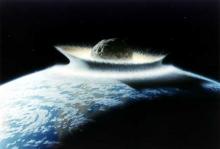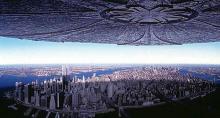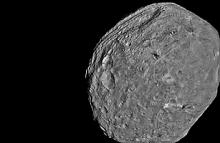Scientists Go "Mythbusters" On Actual Killer Asteroid
Scientists look at diverting the path of a near-Earth asteroid by smashing stuff into it.
It seems that every 8-10 years there's the imminent threat of another asteroid heading toward the planet, potentially wiping out life on Earth. This decade that asteroid is 99942 Apophis, a near-earth asteroid that is expected to pass very close to Earth in about eighteen years (circa 2029 CE) and, although missing us, it will pass through a strange gravitational "keyhole" that will slingshot the space boulder back around to possibly collide with our planet seven years later (circa 2036 CE). This has prompted scientists in China and the U.S. to propose measures to divert the asteroid away using a tried and true tactic for diverting other earth-bound objects moving at high rates of speed; smashing things into them.


